Formerly incarcerated people face barriers to a second chance. A SC nonprofit bridges gap.

- Oops!Something went wrong.Please try again later.
For roughly two dozen people sitting in the church parlor of Greenville’s First Baptist Church on a rainy Thursday in April, it’s their first week out of prison. Hypothetically, at least.
The group is participating in a reentry simulation put together by Soteria Community Development Corporation, a local nonprofit in Greenville that helps people leaving South Carolina’s prison system get back on their feet. Each receives a player profile and assumes the identity of someone who’s just finished their sentence.
Many are unemployed, unhoused and have little money on hand, and must navigate how to attend treatment and counseling without a car or make payments on restitution, license reinstatement fees or child support.
During week one, the bulk of the group rush the table labeled “transportation” to purchase tickets and move forward to others labeled “career center” or “food bank.” By the end of week four, the end of the simulation, 10 participants are back in jail. Most never got a job.
Participants describe the simulation as frustrating or challenging. Several said they struggled through it because they didn’t know what to do next.
“If a person had mental health issues, where do they start to navigate through this process?” one person wrote on a feedback form.
When the simulation ends, Christopher Pritchard, a case manager with Soteria, asks those staffing each booth to stand. They are all Soteria volunteers or program participants, and the majority have a criminal background. For them, the simulation was, and for some still is, the reality of returning to society after incarceration.
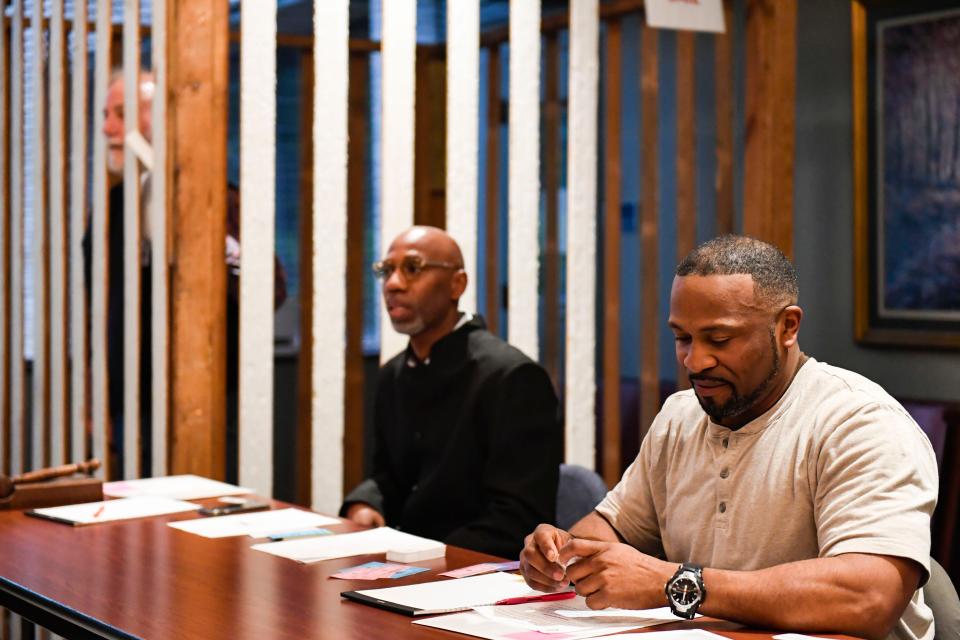
Around 30% of South Carolinians have a criminal record, according to the SC Appleseed Legal Justice Center. Nationally, between 70 million and 100 million people, roughly one in three Americans, have a criminal background according to The Sentencing Project. Yet many of those individuals struggle for access to even the most basic needs upon reentry from prison.
There are over 44,000 legal barriers that limit or prohibit those with criminal records from employment, housing, education and other opportunities, described as collateral consequences, nationwide, according to the National Inventory of Collateral Consequences of Conviction.
The inventory identifies at least 645 state legal provisions that act as collateral consequences specifically in South Carolina.
The state is ranked 39th in a three-way tie with Alabama and Mississippi in a 2022 report from the Collateral Consequences Resource Center, which evaluated laws that help restore rights and opportunities for formerly incarcerated people in all 50 states, D.C. and the federal system.
However, although these systemic barriers to a house, a job, or even simple identification exist, organizations like Soteria, led by those directly impacted by the criminal justice system, work to fill in the gaps.
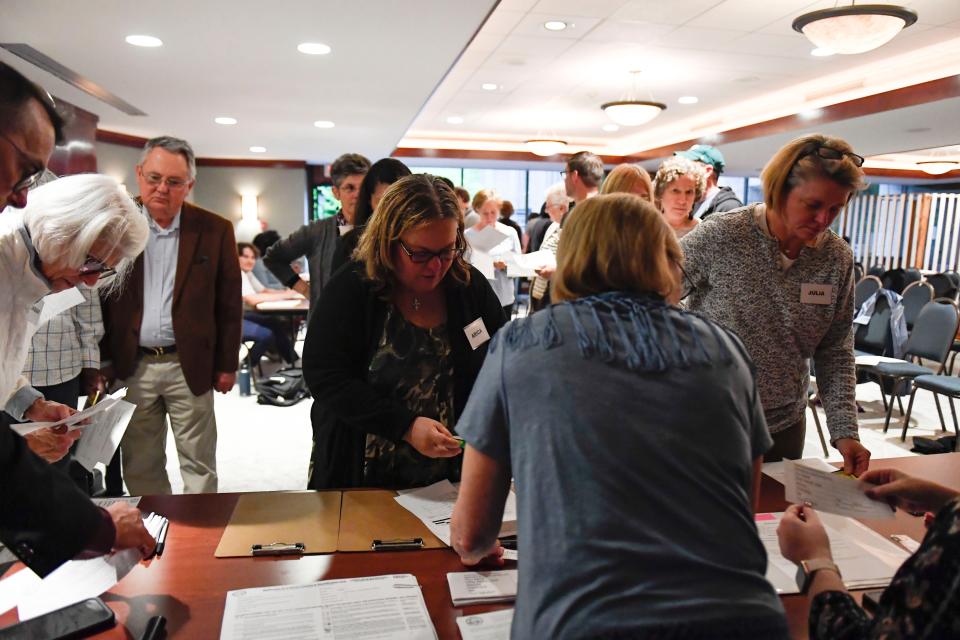
A reentry blueprint first drafted in a South Carolina prison
Jerry Blassingame envisioned Soteria from a prison cell at McCormick Correctional Institution in the late 90s. He was sentenced to 20 years in 1995 for drug charges but was paroled after only three and a half years.
During that time inside, the Greenville native reflected on his journey and often journaled his plans for a new life outside, as well as one to build a ministry to help other men on their own path after incarceration.
“I just started writing down what would help me and what was needed,” Blassingame said. “This is what I need when I get out. I'm gonna need a home when I get out. I want to start a nonprofit. I need to fix my credit when I get out.”
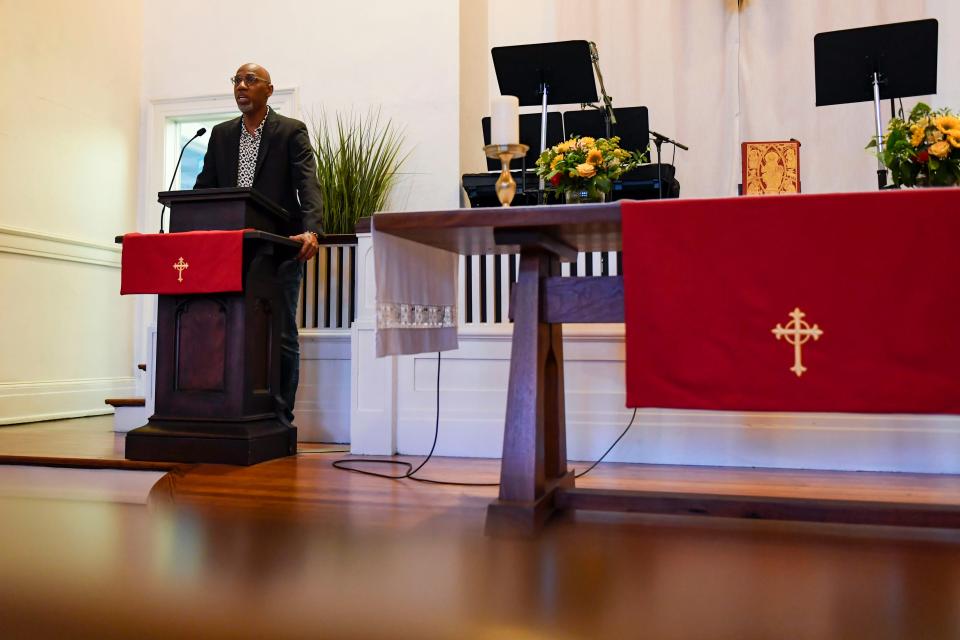
When he was released in 1999, he first tried to go back to school and finish a degree in architecture but soon realized his criminal background wouldn’t allow him to obtain the license needed to pursue a career in the trade. Blassingame faced firsthand a collateral consequence of conviction, a barrier to employment.
Instead, with those old journals as a blueprint, he founded Soteria CDC and opened the program's first transitional house in 2001.
After 22 years, Blassingame, 56, has built a program rich in partnerships with other nonprofits, community advocates, employers and religious institutions that open doors for men and women leaving the state’s prison system that would otherwise be shut.
Soteria relies significantly on donors and grants, which make up roughly 64% of the program's revenue according to its 2022 annual report. According to Soteria’s form 990 from fiscal year 2021, the most recent tax form available, $925,000 came from grants and contributions.
The nonprofit now operates two transitional houses, one for men and one for women. Each offers housing for up to 16 individuals to live for 6 or 12 months once they're released from the South Carolina Department of Corrections.
At the beginning of each month, arrangements are made to pick up new program participants from SCDOC facilities in the Upstate or as far as Columbia. Individuals often leave prison without other means of transportation, a place to live, and sometimes, without a driver's license or any other state-issued identification.
“They give them a Greyhound bus ticket to the city where they were sentenced,” Blassingame said about a typical experience for someone leaving a facility upon release.
S.C. Department of Corrections spokesperson, Chrysti Shain, said returning citizens who do not have transportation are provided a bus ticket by the department to get them “as close as possible to where they will reside.” The department provided 80 bus tickets per month on average to returning citizens in 2022, she said.
“This is far different from 10 years ago when Director [Bryan] Stirling took over the agency. We now encourage family members to reconnect with their incarcerated loved ones. It makes for a safer reentry process and saves tax dollars,” Shain said.
Soteria offers a space for these individuals to live free of charge for at least a month or until they're able to find employment. Even after, the program fee is $600 a month and includes food, housing, transportation and a number of resources and classes aimed to assist participants in getting their lives back. The support is critical for those who leave without a car or a job, or who need to pay to reinstate their driver's license, for court-ordered fees or for any treatment services.
“It slows the world down and they give you time to just focus on what you need to do to be successful when you do go back out there,” said Nick Burnside, 42, a current resident at the transitional house for men.
Then from day one, much like Blassingame did over 25 years ago, they write up a plan for the future.
Soteria offers structure and connection where systems fail
In late December 2022, Zane Gray stepped foot in Soteria’s transitional house after two years in custody.
Raised in Greenville, Gray, 42, struggled with alcohol from a young age. He had a great childhood and grew up with his mother and father in his household, which he said didn’t happen frequently as a Black child. But he watched his elders drink and party and still head to their jobs each day, so he grew to believe if he worked, he could continue the habit.
“It just went too far, ended me up in a bunch of fights, ended up with bad decision-making and definitely bad relationships,” Gray said during an interview in March. “But I got a job, so, that's an illusion. We think it's OK, but you're not OK, and those decisions ended me up in prison. Now, I don't drink at all.”

After high school, Gray went into the National Guard at 21 and later got certified in welding at Greenville Technical College. Before he went to prison, he was making more money than ever. He was set.
“I was at the top of my game when I got locked up that got taken away from me because of some drinking,” Gray said.
It wasn’t Gray’s first time in trouble, but this time he lost everything, and this time his main support system, his mother and father, were no longer around.
“They're gone,” Gray said about his parents, who’ve since died. “Now I look at myself in the mirror and I'm like, I'm here. I got to take care of me. That’s what kind of like, clicked that time to be like, ‘I need to change my habits.’ Nobody was there.”
After prison, Gray had to start all over again. But like dozens of others who’ve gone through Soteria’s transitional program, the staff became his support system.
Applicants for Soteria’s program write a one-page essay on their short and long-term goals after release while they’re still incarcerated. When they arrive, that essay turns into a project plan with target dates for everything needed before the end of six months or a year.
“You say by this time you’ll have your ID, by this time you can go to school, by this time you're going to do this. Once they start going on that list, by the time they get to 12 months they should have checked off every box,” Blassingame said. “That determines graduation for the most part. They tell us what they want, we don't tell them. We just have all the courses and classes we do that help them get to that place.”
A course is offered almost every night for residents of the transitional house, including classes on health and wellness, financial literacy, relapse prevention or a Bible study. In the women’s home, courses in parenting and classes in art therapy are also offered.
Graduates of the 12-month program are required to complete at least 102 hours in financial literacy courses, which allow individuals to learn about opening new bank accounts and establishing credit and retirement savings.
“They have a financial workshop that people can at least get the basic knowledge of like credit, loans and stuff like that, where they can also use that to maybe get a car or house or that can help you in the future,” said Zhan Cobb, 27, a resident at the house.
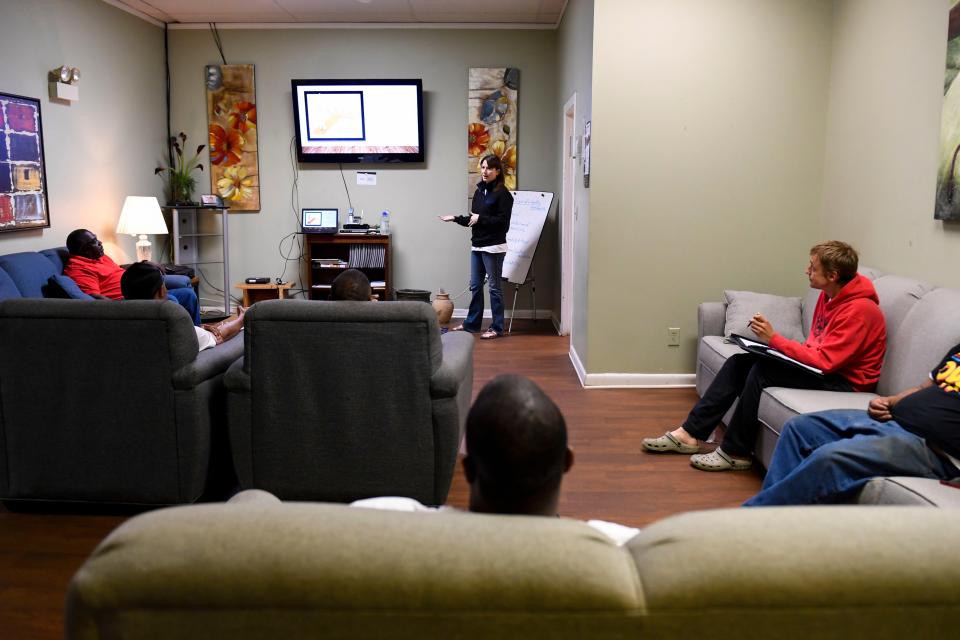
Blassingame even established a savings match program, called the Individual Development Account (IDA). Every resident who saves up to $1,000 can receive a match of $2,000, as long as the money is spent on an investment such as education, a car, a home or starting a business.
Soteria offers a parachute ― a place to live, to get around, a roadmap for saving money ― an investment that hundreds of others leaving SCDOC facilities every month, an average of 425 per month last year, don’t have to safely land with after their release.
Collateral consequences create barriers to housing, employment or other services
Affordable housing stock is already scarce in Greenville. But for those with a criminal background, admission into housing sponsored by public housing authorities is especially difficult.
Under federal law, public housing authorities are required to reject any applicant who was previously convicted for the production of methamphetamine or is registered as a lifetime sex offender. Beyond those, authorities have broad discretion to deny applicants for any other criminal conviction. Each housing authority in South Carolina has its own unique policy.
“Even regular people, like private landlords, they discriminate all the time, because even if you got a misdemeanor, sometimes if they can pull your record and something’s on there, they won't rent to you,” Blassingame said.
Beyond Soteria’s transitional housing program, over the past two decades, Blassingame has acquired 14 homes to rent for low-income residents or families in Greenville County. Four more homes are in the construction phase.
“We have people call us all the time looking for housing because they know we are friendly to people with criminal records,” he said.
Before this year, people with criminal backgrounds in the state could be denied hundreds of occupational and business licenses – from real estate to cosmetology ― which created significant barriers to employment. However, in April legislators passed H3605, which prohibits the denial of a license just based on a past conviction, unless the conviction directly relates to the duties, responsibilities or fitness of the occupation.
“It creates due process for people where there wasn’t any before, which is huge,” said Bridget Brown, deputy director of SC Appleseed.
Still, private and public employers have a significant amount of discretion in hiring. Over the years, municipalities like the city of Columbia and the city of Greenville have established “ban the box” ordinances, which eliminate blanket denials for applicants with criminal convictions. But Brown said advocates are still pushing for a statewide initiative.
“We're not saying that there's not a scenario in which this shouldn't be taken into consideration or ignore it altogether. We're just saying that we need to be intentional about that consideration and there needs to be a nexus,” she said.
For Soteria, Blassingame has spent years establishing relationships with local employers to help participants get access to jobs. Many of the men and women in the program have gotten hired at ADUSA Distribution in Mauldin or at local restaurants and hotels.
“You got mom-and-pop businesses that care about their people, and they will do it, like the small business people will hire somebody with a criminal background before a corporation,” Blassingame said. “I think we've had more success from small businesses than anybody else because they really care.”
Simply getting state identification or a driver's license, a crucial need to even obtain employment or housing, can be elusive for those leaving prison.
Identifying documents often expire or get lost while people are in state custody. Others may face convictions that lead to a suspension of their driver’s licenses, forcing them to pay exorbitant fees to have them reinstated.
Nikki Grimball, an incarceration services program specialist with the Catholic Charities of South Carolina, said he noticed a lack of impact from his reentry program when it first began at Manning Correctional Institution in Columbia. He said it was primarily focused on employment skills.
“I realized the dividing line was that everybody was leaving incarceration without an ID, without a basic birth certificate and without Social Security cards,” Grimball said. “Even with all that training and investment of time, building resumes and how to prepare for a job interview, they couldn't walk through the doors and get employment, and if they couldn't walk through the doors and get employed, that means they also couldn't walk through the doors to be housed or get treatment.”
Shain said staff will review offender files no later than 24 months before release to identify those in need of identification credentials and will work to get documents through agreements with state Department of Motor Vehicle Services, Department of Health and Environmental Services and Social Security Administration. Any credential received is placed in a person’s file and given to them on the day they are released.
“This is different from 10 years ago when all documents were sent home and many were lost. SCDC made a policy change to work with inmates to keep and secure their documents,” Shain said in an email.
According to the agency’s 2022 accountability report, the Department of Corrections secured 1,221 DMV IDs, 567 in-state birth certificates, and 2,443 Social Security cards. This data collection began the same year.
Those leaving with identification can still face reinstatement fees from the DMV, $100 for each suspension, or be required to take the South Carolina Alcohol Drug Safety Action Program (ADSAP), before regaining their driver's license.
ADSAP is a program often required for those who have been charged with DUIs or drug-related charges. People enrolled must pay at least $500 for educational services but could see costs up to $2,500 for other treatment-related services, including drug tests.
“It adds up, costs money, and people don't have money coming out of prison,” Brown said.
The program is only offered at one certified location in Greenville County, The Phoenix Center.
“Our lack of public transportation makes it difficult to get to those programs or all of the places that you need to go to complete any of these requirements,” Brown said. “If you're trying to get a medical record, if you're trying to get to the Social Security office, if you're trying to get to the DMV. Then if you can't get your license because the reinstatement fees continue to stack up, then you can't get a job, you end up driving without a license and the cycle starts all over again.”
Despite these barriers, Gray took his welding experience and got a job with SC Steel in Taylors in January.
“I messed up, but I'm not what's read on paper. It's more than what's on paper, it's the heart in the individual, the spirit of the individual that supersedes what's on paper,” Gray said. “It's a beautiful thing to be able to just put that narrative behind you.”
Grassroots organizations lead the way in breaking down barriers at SC statehouse
Although legislation, like H3605, created a path toward employment for people with criminal backgrounds after years of effort from stakeholders, advocates say more needs to be done to break down systemic barriers for those leaving prison.
“What we're asking for with a lot of these bills is just let's make it make sense, and give people an opportunity and a second chance,” Brown said. “Especially when we know that if people have homes, if they have jobs, if they have driver's licenses, that those things significantly reduce recidivism rates. What can we do to ensure that people have those things?”
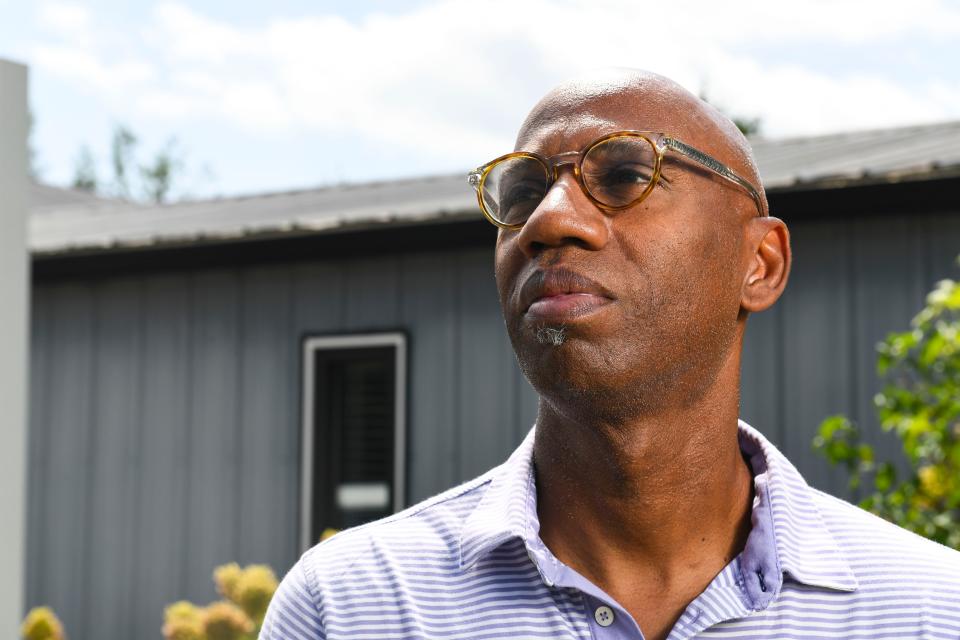
Blassingame has fought for legislative change for years, consistently going to testify at the statehouse. In 2018, he was instrumental in legislative action that made minor changes to the state’s expungement process, one of the most viable ways for formerly incarcerated individuals to gain access to resources. That year lawmakers passed a bill that made first offense drug convictions expungable from a person’s record. But the effort took 13 years.
“Can you imagine, 13 years, almost every year going to testify and talking to people?” Blassingame said. “A couple of years I didn't go down. I'm like, I'm done.”
In August, the state Department of Corrections announced a partnership with Concordance, a national reentry organization based in St. Louis, founded Danny Ludeman, a former CEO of Wells Fargo Advisors. The deal comes with a $60 million investment from Wells Fargo Bank to open a reentry center in the Greenville-Spartanburg area in 2024. Spartanburg and Greenville County ranked one and two for the number of people committed to the state’s prison system last fiscal year.
Blassingame said he and other community advocates are skeptical.
While the state’s percentage of people returning to prison within three years has dropped from 22.3% to 17.8% from 2015 to 2019, according to the most recent data from the S.C. Department of Corrections, Blassingame says grassroots organizations like his were fundamental to making that change.
“The first question asked of them was why South Carolina?” Blassingame said about a local stakeholder meeting with Concordance shortly after the announcement. “They said, ’The Department of Corrections in South Carolina had done such a great job with reducing recidivism we wanted to come here.’ And I stopped them in their tracks, and I said the Department of Corrections is not responsible for reducing the recidivism rate in the state of South Carolina. The Department of Corrections are locking people up. They're not about what we do. We have been the ones in this room that's been doing it.”
According to Soteria’s 2022 annual report, the program served 46 individuals with Soteria’s transitional housing programs, 38 people in need of affordable homes and 416 walk-ins in need of reentry assistance last year. The recidivism rate for the 12-month program was 0% and 7% for the six-month program, and in total the program recidivism rate was 10% from 2017 to 2021.
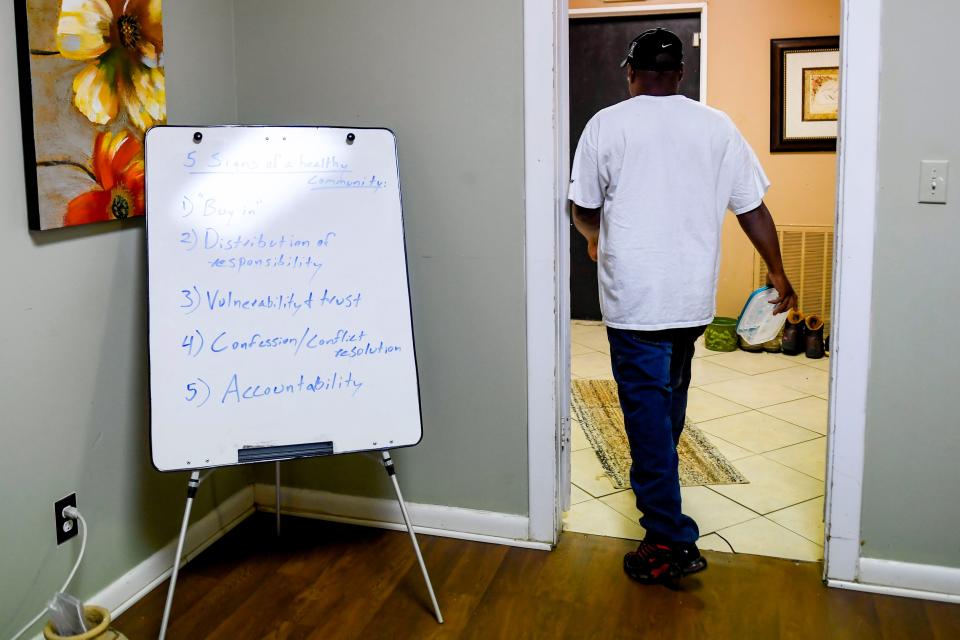
“SCDC is so thankful to our community partners for all they do to help inmates successfully reenter society. The department could not have achieved its low recidivism rate, which continues to fall, without strong community support,” Shain said in an email.
In an interview, Michelle Smith, president and chief operating officer of Concordance echoed Shain’s sentiment about the importance of local programs. Smith said outreach to community stakeholders, like Soteria and other services, will start now that the partnership has been agreed to and announced.
“I think that everybody who is working in reentry, whether it be in Greenville, South Carolina, or across the nation, is absolutely contributing to lower recidivism rates,” Smith said. “It really is a true partnership. We all have to support each other, and we have to really support those that are returning to our community.”
Shain further explained Concordance, like Soteria and Catholic Charites, does not have a financial agreement with SCDOC and no tax dollars are involved. Participation in the program will be voluntary. The services they will provide, including legal services, mental health services and family reunification, among others, are at no cost to the department or the individual. Concordance is self-funded through the CEO’s relationship with Wells Fargo and other investors, she said.
Concordance will not provide housing for participants but will provide assistance if necessary.
“I want to give them credit that the doors are open, the doors are open for the community now to have some investment in changing things because if it wasn't broken, there would be no need for change,” Grimball said. “But this is broken, and we know it's broken, and just the change in recidivism is not enough. Some of the processes of what's going on within the state system just aren't functioning.”
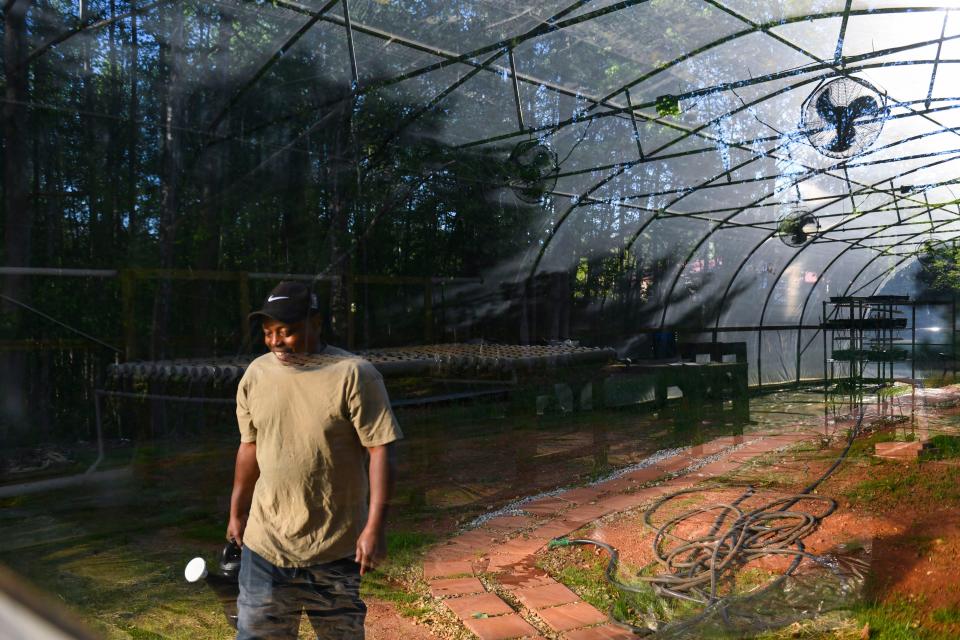
Vulnerability and community pave the way for success in Soteria’s house
What’s especially unique about Soteria from other reentry organizations is almost every employee was previously incarcerated. Having people sit across from you who can understand your plight makes for a better experience, Blassingame said.
“I’m vulnerable,” Blassingame said. “I'm an open book, I don't have anything to hide, and I found you get more when you give more. That's how we created the space, and I teach my staff the same thing.”
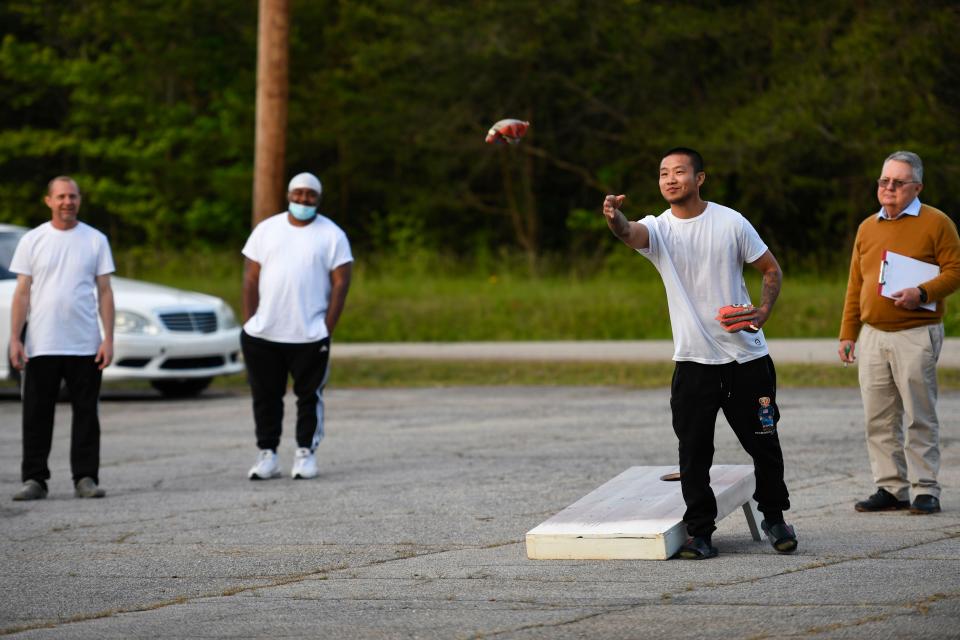
Bob Norwood, director of Soteria's program for men, was once a participant in the program himself in 2019. Now, he manages and runs the transitional house as new ones come through.
“You can tell he cares, and he knows what you've been through, he's been there,” Gray said about Norwood. “That connection alone, there are certain things you can help people with, but it's a different kind of help when you've been through it, and you know exactly what that person's going through and the state that they’re in.”
Burnside described feeling on edge when he first arrived at the house in February after five years in custody. He had to learn he no longer had to look over his shoulder and that violence wasn’t around the corner. He kept to himself for the first couple of weeks. Prison is its own world, he said.
“The comfort of just knowing that the people care, gives you the energy to want to pursue your dreams and just keep going, because it's all really hard alone,” Burnside said.
On a cool Friday in May, the men gather outside the house before dinner for game night, a weekly institution and a chance for them to grow in community. They each take a turn playing cornhole. The winner gets a meal at City Range Steakhouse, and Norwood will foot the bill.
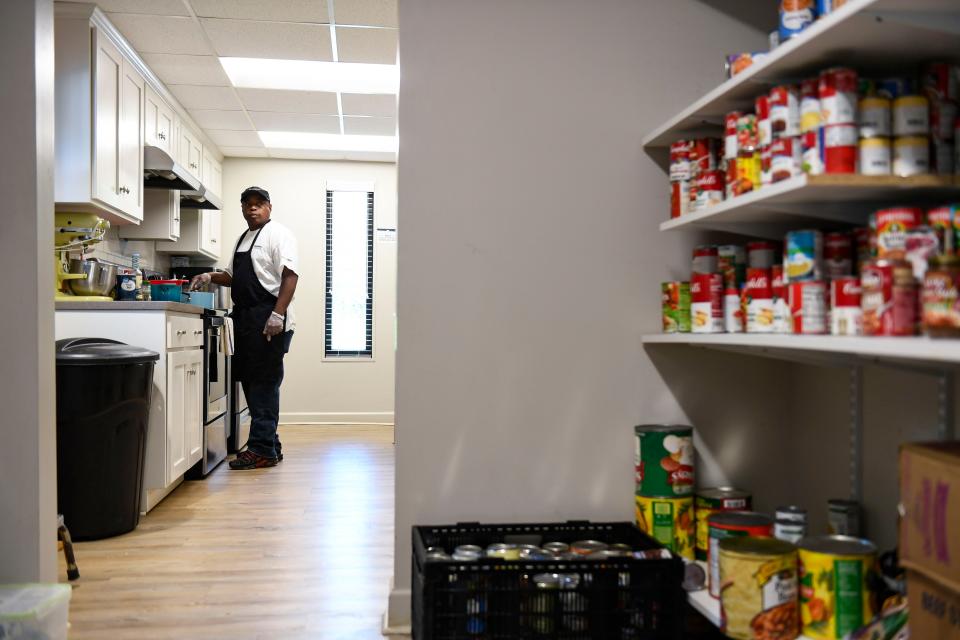
Inside the sound of fish and shrimp sizzling as it fries fills the kitchen. Kevin Light, formerly the house cook, recently returned from the greenhouse outside. The garden is a more recent endeavor from Soteria to bring a farm-to-table experience to the home.
“I don’t throw away anything,” Light said as he shows the lettuce, carrots and other greens he’s grown over the past two months.
The men return inside for dinner. They eat, chat about their days, and laugh together. Then they each take off to bed, with another day in their journey to a second chance complete.
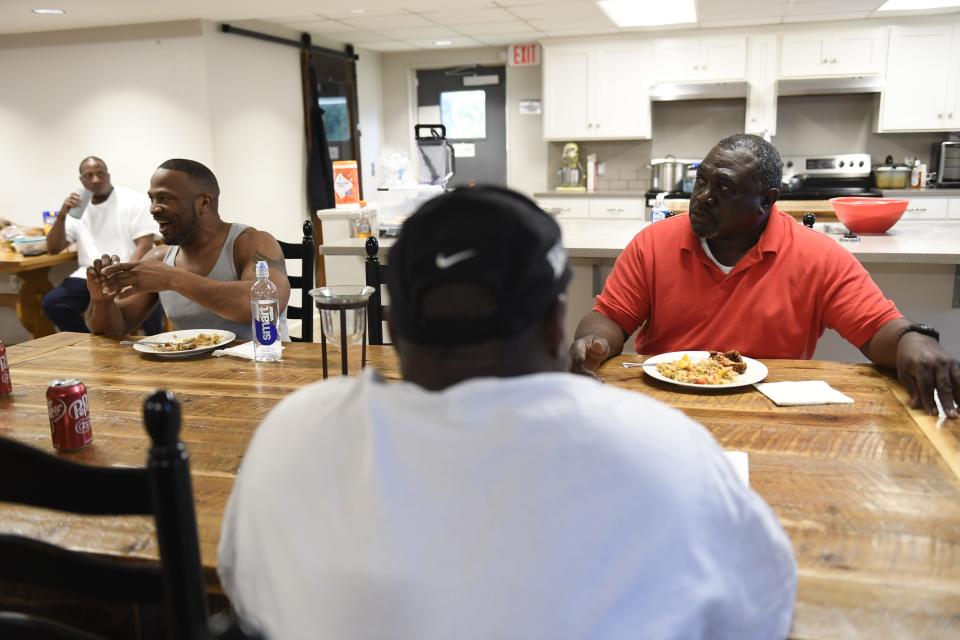
Three months later, in August, Nick Burnside used his IDA to purchase a new car. He got his license back in March. He currently works for ADUSA and has a long-term goal to get his commercial driver's license. Work has been his safe haven, he said.
Zhan Cobb graduated in June after 12 months in the program. He used his IDA on a car, enrolled at Greenville Technical College’s program for aircraft maintenance and is currently waiting for construction to finish on of Soteria’s low-income rentals to move out of the transitional house. At his graduation, he said he’s hoping to make better decisions and have a better future, “just like what Jerry did.”
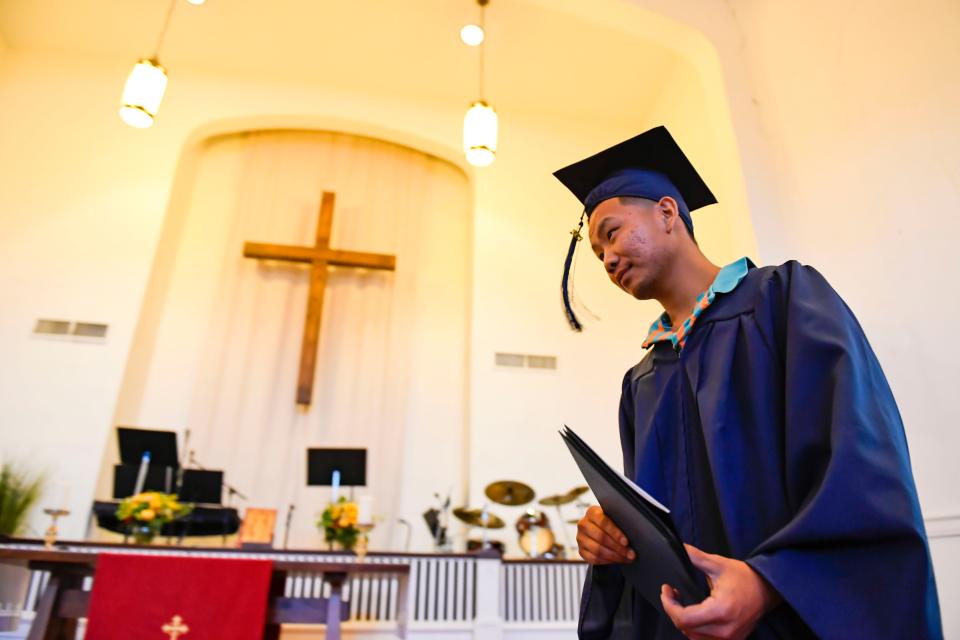
Zane Gray moved out of the transitional house and into his own. He recently got his driver’s license and a promotion at SC Steel to a supervisor. He’s an official six-month graduate of the program.
“We like the finished product. We don't like the work to get to it, the work that took place to make it, what it grew into, what it became,” Gray said back in March “Everybody likes the story after the success. Nobody wants the story during.”
Kathryn Casteel is an investigative reporter with The Greenville News and can be reached at KCasteel@gannett.com or on X @kathryncasteel.
This article originally appeared on Greenville News: Greenville nonprofit Soteria helps people leaving SC prison system

